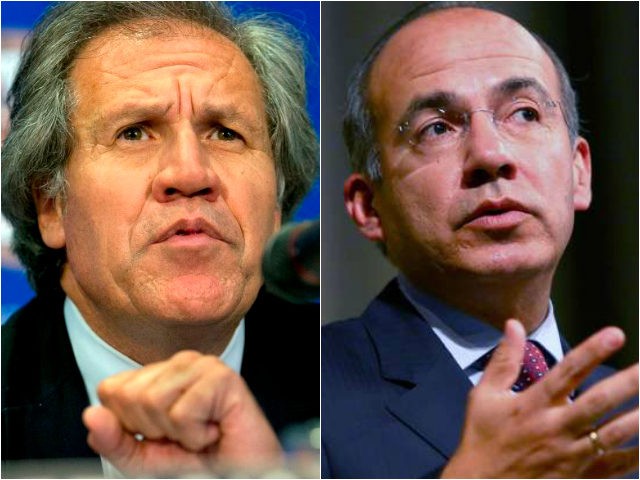In what many observers are deeming an embarrassing rebuke of human rights activism on the island, the Communist Party of Cuba refused to allow Organization of American States (OAS) head Luis Almagro and former Mexican president Felipe Calderón enter the country.
The pair were on their way to an event organized by the anti-communist group Youth for Democracy, which planned to honor Almagro with a human rights advocacy award named after late dissident Oswaldo Payá. Payá’s daughter, Rosa María, is the head of the Youth for Democracy and Cuba Decides groups.
Cuban officials described Almagro’s presence at such an event as an “unacceptable provocation,” and celebrated themselves for thwarting what they claimed to be an international plot to undermine the communist regime.
Almagro explained in posts on Twitter that his petition for a visa to Cuba was rejected, making it impossible for him to fly into the country. He added that he did not see any reason for a free and democratic government to fear his presence.
“My trip to Cuba was no different than others I have made to attend similar events in Latin America organized by civil society,” he said on Twitter. “An analysis as superficial as alarmist, seems to have warned about the danger that my visit and the ceremony announced could have for the future of Cuba-United States relations, and the welfare of the Cuban people as it could motivate a hardened attitude by the government,” he added.
“It would be quite ridiculous that after 67 years of revolution, both the well-being of the Cuban people and bilateral relations with the United States depended on this ceremony,” he concluded.
Calderón, the former Mexican president, was not allowed on board his flight to Cuba for similar reasons. “I insisted that I was going to go and that I would go in peace,” he explained, “that I would be respective and it was not an act of subversion.” He refused to attempt to get on the plane by force, he added, because it would “generate a diplomatic conflict between Mexico and Cuba.” “Such despotic and ridiculously primitive attitudes do not deserve it,” he added.
“It is sad, but also outraging and very dumb, and I think it speaks very ill of Cuba. All these expectations that things would change, that Fidel [Castro’s] death would change things, that this new relationship with the United States would open doors, are shattered,” he concluded.
The Communist government issued a statement Wednesday insisting that the measures were necessary. “The plan… consisted of mounting in Havana an open and serious provocation against the Cuban government, generating internal instability, damaging the country’s international reputation,” the government said in a statement. The statement accused Almagro personally of “an ambitious agenda of self-promotion with attacks against progressive governments like those of Venezuela, Bolivia and Ecuador,” all socialist countries with spotty democratic records, whose support Cuba has enjoyed for years.
In Cuba, police arrested and beat those planning on attending the event, including individuals who were scheduled to receive awards for their work in human rights advocacy. According to former political prisoner Iván Hernández Carrillo, who was among those to be awarded, at least fifty individuals were attacked and arrested.
The group did not cancel the event but are advocating for Havana to let Almagro travel to the country and receive the award. Rosa María Payá has begun distributing a petition to urge the government to let him in.
Almagro, meanwhile, has published the speech he wrote and intended to deliver in Cuba. “The raison d’etre of the OAS should always be to ensure that, in the Americas, democracy and human rights triumph over authoritarianism, inequality, social exclusion, and corruption, and the erosion of political rights and fundamental liberties,” he wrote. “We should take care to express our opinions, but also to ensure that opposition members have the right to express their own ideas.”

COMMENTS
Please let us know if you're having issues with commenting.